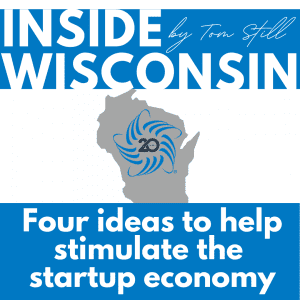By Tom Still
 MADISON, Wis. – For an economy to flourish and constantly refresh itself, new ideas, products and companies must rise to take the place of the old. It’s a phenomenon economists call “creative destruction” and it has driven the American and Wisconsin economies for generations.
MADISON, Wis. – For an economy to flourish and constantly refresh itself, new ideas, products and companies must rise to take the place of the old. It’s a phenomenon economists call “creative destruction” and it has driven the American and Wisconsin economies for generations.
Startups and scale-ups push up from below in the economy, creating most net new jobs in the United States as older companies mature, sometimes shedding jobs or shutting down.
The number of U.S. businesses one year old or younger has been tracked by Statistica since 1994, when the total was roughly 570,000. It rose sharply in the late 1990s and early 2000s, beginning to fall again in the late 2000s as the Great Recession took its toll. From a low of 560,000 in 2010, the total has climbed somewhat steadily ever since to 804,000 in 2020.
In Wisconsin, the growth in startups has been less robust, although the survival rate of those young companies is among the nation’s strongest, according to sources such as the Ewing Marion Kauffman Foundation and the Wisconsin Department of Revenue.
Other organizations have noted emerging startup hubs in Wisconsin. Recent examples include the Brookings Institution, the Chicago Council for Global Affairs and CompTIA, which named the Madison area as one of the 20 most vibrant information technology hubs.
Whatever the rankings, Wisconsin can do more to establish itself as a state that values entrepreneurs, startups and scale-ups. Here are a few ideas:
Keep up with the neighborhood “Joneses” when it comes to venture capital. The state budget bill includes a plan to invest $100 million in a “fund-of-funds” that would attract twice that amount of private capital over time. The “Wisconsin Fund” would have many of the characteristics that have made Illinois, Indiana, Ohio and Michigan much more welcoming to venture capital, which has helped emerging companies in those states while providing returns on investment.
Early stage investing in Wisconsin appears to have held up well during late 2020 and so far in 2021, despite the COVID-19 pandemic. A state investment in its own startup economy would send a powerful message to investors beyond Wisconsin: “Come check us out.”
Avoid state-based research restrictions. With a strong research foundation embodied in many public and private institutions and companies, it is vital that Wisconsin maintain a hands-off policy as it relates to state-based research restrictions. Whether they come from the political right or the left, restrictions that put Wisconsin innovators at a disadvantage versus those in other states send a chilling message. Let’s attract entrepreneurs and researchers to Wisconsin, not scare them off.
Compare “fence-me-in” regulations in Wisconsin with those in other states. Professional and occupational licensing shouldn’t be a “fence-me-in” strategy to exclude new entrants to the marketplace. National groups such as the Kauffman Foundation have long insisted that overly burdensome and expensive licensing requirements inhibit entrepreneurial growth.
Closer to home, groups such as the Badger Institute have called for licensing reforms and noted that 10 other states have implemented reciprocity agreements that improve talent attraction. It’s a strategy that can unite free-market advocates and those who think the status quo works against women and minorities, especially at a time of pandemic recovery.
Create clear paths for foreign-born entrepreneurs. Many foreign entrepreneurs are interested in starting businesses in the United States and are unable to do so because of immigration laws. The International Entrepreneur Rule, created shortly before President Obama left office, allows some foreign startup founders to remain in the United States without a visa but was never really funded.
With the program still technically alive, entrepreneurs, investors and others are urging President Biden to get behind it with outreach and hiring dedicated staff to judge applications.
Unlike Canada, the United Kingdom and a dozen other nations, the United States doesn’t have a visa program that supports business creation by foreign entrepreneurs. Most often, these are people who were educated at American colleges and universities and who would like to stay. Instead of kicking them out to compete against us, let’s find a logical and careful way to keep many of them here.
Still is president of the Wisconsin Technology Council. He can be reached at tstill@wisconsintechnologycouncil.com


